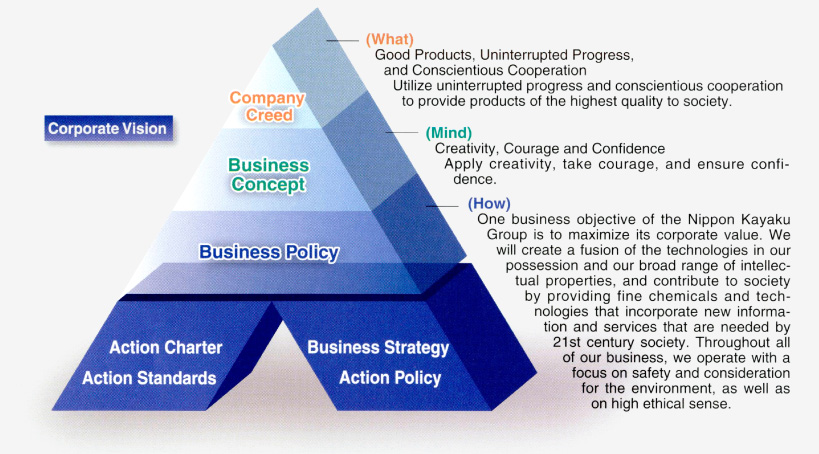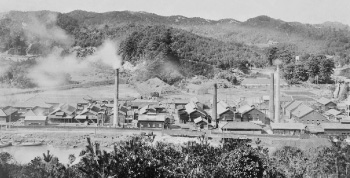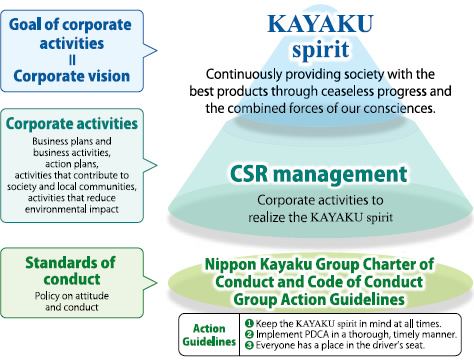This is an introduction into Nippon Kayaku’s management approach and the changes in our corporate visions coupled with a historical background


After leaving Mitsui & Co., Ltd. in 1914, and up until he entered the political world in 1920, Jotaro Yamamoto was involved in the development of more than 30 companies in various fields, including the chemical industry, mining, electric power, textiles, and businesses in the South Seas. He constantly kept in mind the global development of Japan’s strengths when pushing forward with his private businesses.
In 1914, World War I broke out hindering the importation of explosives, which was the same as with other consumer goods. This created an extreme shortage. In light of this, Jotaro Yamamoto, along with Suzuki Shoten, a general partnership, and Mogi, another general partnership, established Japan’s first private-sector explosives company in 1916.
Jotaro Yamamoto took on the position as the second president of Nippon Kayaku in June 1922. It was during a time when a series of private explosive companies were being founded and companies were required to establish a management structure that would enable the company to stand up to intense competition, which included importers.
Nippon Kayaku was not only involved in the manufacturing of explosives but also aimed to contribute to the development of resources and help promote industry. To this end, the Company believed it best to create a comprehensive explosives business, which included pyrotechnic materials such as fuses and detonators. After becoming president, Jotaro Yamamoto promoted positive steps in this direction.

Since its founding, Nippon Kayaku has used these trademarks for its three businesses—explosives, dyes, and pharmaceuticals. The trademark for the explosives business also served as the company emblem.

Japan’s post-war rapid economic growth started in 1955 and lasted for 18 years. In July 1960, Hayato Ikeda became prime minister. The centerpiece of the Ikeda administration’s policies was the plan to double the national income. From 1961 to 1970, Japan’s real economic growth rate rose to 10.9% and its per capita consumer spending increased 2.3x during this ten-year period. Japan’s growth was referred to as the “Asian miracle.”
In January 1962, Yasusaburo Hara, the third president of Nippon Kayaku, announced his goal and determination to win the Deming Prize. He emphasized that the basic policy of Nippon Kayaku was to provide society with good quality products at low prices. Consequently, on November 20, 1962, President Hara released the corporate motto and corporate spirit, which specify the company’s management philosophy, to achieve a wider and more thorough understanding of Nippon Kayaku’s management philosophy by its employees.


In 1979, when the world was in economic crisis, OPEC continued to hike crude oil prices. This triggered the second oil crisis and pushed the world into a severe recession. Japan’s economic policies took a turnaround to control inflation and in less than a year’s time the official discount rate was raised five times. In March 1980, the official discount rate reached an unprecedented high of 9.0%. The economy cooled off rapidly and consumer spending slumped. There was no evident way to save exports, mainly due to trade friction. In December 1980, President Junzo Kondo was appointed to the position of vice-chairman and Tsunekazu Sakano, a senior managing director, was appointed president. President Sakano advocated the creation of a structure that could readily adapt to the new era. One premise was that Nippon Kayaku be a company that protects human life and health, and constantly contributes to the human race with products and technologies that support a rich cultured lifestyle. To achieve this, the fundamentals for management and corporate behavior were defined as creativity, courage, and confidence.

In June 1986, Nippon Kayaku created a new corporate symbol on the 70th anniversary of its founding. This served as the starting point for business activities moving toward the 21st century.
The two circles represent interaction between people and the trust between the Company and society. The space in the middle signifies the world, Earth, and the universe. The two elliptical shapes represent our two major technologies—pharmaceuticals and chemicals. They are shown as soaring to represent constant creativity and challenge. The corporate color is a youthful blue that calls out to the new era. We have dubbed this “Nippon Kayaku blue.”


It became clear that to be a winner, it was necessary to capture markets in countries and regions that boasted high economic growth. Along with an increase in the number of overseas subsidiaries, the Nippon Kayaku Group evolved into a global corporation consisting of 57 group companies worldwide, including six domestic factories and four domestic research labs. Meanwhile, global markets began to change at an even faster pace and competition between companies became even more intense. Companies looking to remain in the race had to be able to keep up with this speed. In light with this thinking and to efficiently address market changes, Koichiro Shimada, the eighth president of Nippon Kayaku, executed the KAYAKU spirit (corporate vision) in June 2007. The goal was to get all employees to move in the same direction (vector) as the Nippon Kayaku Group.
The KAYAKU spirit states the Group’s goal of providing the best products through ceaseless progress and the combined forces of our consciences. The “combined forces of our consciences” is unique to the Nippon Kayaku Group. It means that all Group employees share the same vectors and collectively work together (be of the same spirit) to produce good products.
In 2009, the KAYAKU Spirit was redefined as “continuously providing society with the best products through ordinary progress and the combined forces of our consciences.” This reflects our goal to fulfill our corporate social responsibilities while overcoming intense competition with rivals to sustain our existence.
 2011](img/index_title07.png)
Given requirements by society that management be conducted in accordance with CSR, from 2011 the Nippon Kayaku Group began implementing its business operations to achieve CSR management.







![[Mission statement]Combined forces of our consciences Ceaseless progress Best products](img/index_img04.png)






 2011](img/index_title07.png)

